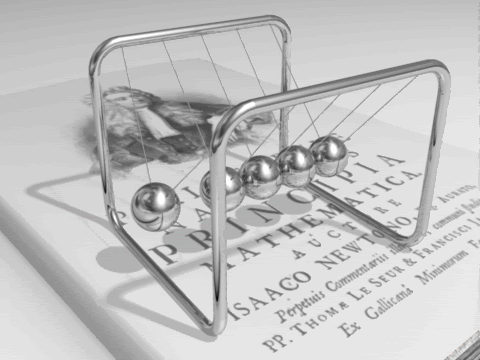 But like a Newton's cradle, when a ball strikes on one side, another ball rebounds in reaction. This wave of anti-religious media has caused a number of books to be written in response, such as God's Undertaker: Has Science Buried God? by John Lennox (spoiler alert: his answer is "no!"), What's So Great About Christianity? by Dinesh D'Souza, and The Devil's Delusion by David Berlinski. The potential positive result is that those people who take the time to carefully read and think through the points presented by both sides will realize that Christianity does have a reasonable response to all the attacks against it that have been raised by the New Atheists. But the ones who approach both sides with an even hand are rare; most people simply subscribe to the misportrayals of the other position given by their preferred side. And sometimes these misportrayals are so ubiquitous that even those who are being misportrayed believe that this is actually the way things are.
But like a Newton's cradle, when a ball strikes on one side, another ball rebounds in reaction. This wave of anti-religious media has caused a number of books to be written in response, such as God's Undertaker: Has Science Buried God? by John Lennox (spoiler alert: his answer is "no!"), What's So Great About Christianity? by Dinesh D'Souza, and The Devil's Delusion by David Berlinski. The potential positive result is that those people who take the time to carefully read and think through the points presented by both sides will realize that Christianity does have a reasonable response to all the attacks against it that have been raised by the New Atheists. But the ones who approach both sides with an even hand are rare; most people simply subscribe to the misportrayals of the other position given by their preferred side. And sometimes these misportrayals are so ubiquitous that even those who are being misportrayed believe that this is actually the way things are. Consider these three common statements about the history of science and Christianity, gleaned and paraphrased from various articles and web postings:
- Medieval Christians believed that the Earth was flat, until Columbus proved the Church wrong.
- The Trial of Galileo was an example of how the Church placed dogmatic religious belief in geocentrism over the scientific evidence for heliocentrism.
- The Scientific Revolution was a triumph of reason over religion, as the early scientists applied science to undermine the authority of the Church.
The general belief is that Christians have always been opposed to science, holding on against the evidence to “anti-scientific” views such as:
- A flat Earth
- Geocentrism
- The Universe was created by design
Here's an example of this caricature (credit Steve Sack, Star Tribune, August 5, 2005):
This is the history that most people—Christians included—believe. But it is a false history, and it is one that Christians should strive to correct in the public perception. My goal with this series of posts is to provide the means to address the previous 3 myths about the history of science and Christianity, so that we can stand on a solid historical footing as we engage in the discussion of science and religion. For when it comes to science and Christianity, history is in fact on our side.
Consider the conclusion of historian of science Colin Russell in his essay, The Conflict Metaphor and its Social Origins:
Consider the conclusion of historian of science Colin Russell in his essay, The Conflict Metaphor and its Social Origins:
The common belief that… the actual relations between religion and science over the last few centuries have been marked by deep and enduring hostility… is not only historically inaccurate, but actually a caricature so grotesque that what needs to be explained is how it could possibly have achieved any degree of respectability” (quoted in John Lennox, God’s Undertaker, p. 26-27).



